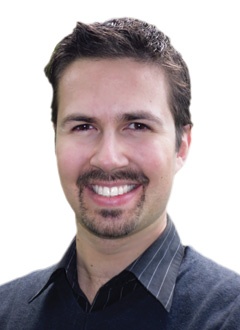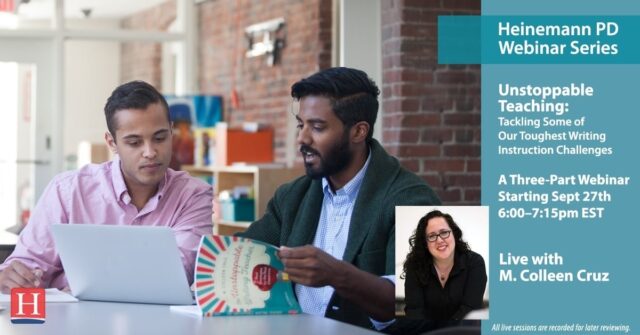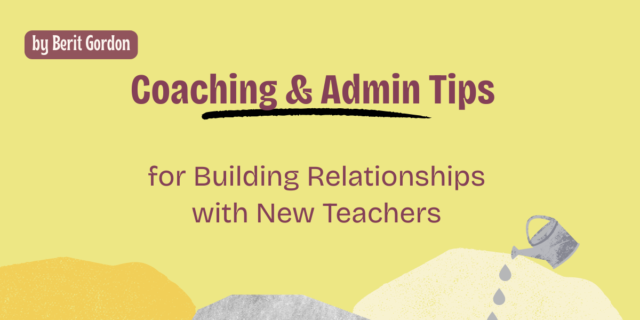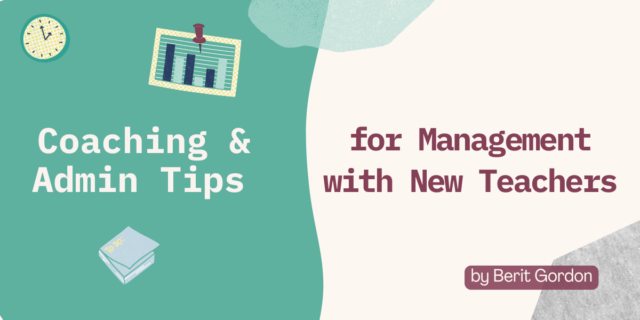
To kick off our month-long webinar series for the new school year, Heinemann is featuring a ”Classroom Essentials for Right Now” back to school blog series written by Heinemann author Christopher Lehman and his colleagues from The Educator Collaborative. Each blog offers practical, heartfelt advice on how to start the year off right. From being a thoughtful, reflective practitioner to creating a joyful community of learners, honoring student voice and choice. How do I choose the right books? How do I help my students become better writers? What do I do about grades? Join us starting this week as Chris and his colleagues share their “Classroom Essentials for Right Now.” In part three of Chris' series, he shares with us a tool for self-reflection created by The Education Collaborative.
To kick off our month-long webinar series for the new school year, Heinemann is featuring a ”Classroom Essentials for Right Now” back to school blog series written by Heinemann author Christopher Lehman and his colleagues from The Educator Collaborative. Each blog offers practical, heartfelt advice on how to start the year off right. From being a thoughtful, reflective practitioner to creating a joyful community of learners, honoring student voice and choice. How do I choose the right books? How do I help my students become better writers? What do I do about grades? Join us starting this week as Chris and his colleagues share their “Classroom Essentials for Right Now.” In part three of Chris' series, he shares with us a tool for self-reflection created by The Education Collaborative.
Educator Self-Reflection as a Political Act
Part Four: Be Brave, Mess Up, But Do Something
Written by Christopher Lehman
In this series, “Educator Self-Reflection as a Political Act,” we started with reminding ourselves of our mission (Part One); then, took on critical reflections about our classroom, practice, and beliefs (Part Two); then, I shared the Strong Classrooms Self-Assessment we developed at The Educator Collaborative to support your self-reflection work (Part Three). In this final post, let’s think about moving from reflection to taking action.
Our children need us. To be specific: “our” does not refer only to the children of Room Such-and-Such, or the children of This-and-This School. “Our children” includes the school across town, the one in that other city, the children in those refugee camps in that other country, and the children risking their lives to find their mother across the border.
As Jose Vilson argues in his essay, A Call to Lock Arms, in The Teacher You Want to Be:
I see we need more teachers who can delve into the more difficult conversations of race, class, and gender in our schools. It’s not enough to be color-blind because color blindness suggests we ignore a larger part of each student’s person. Instead, we should set forth a more color-conscious pedagogy, one that embraces cultures and reaffirms their self-worth. For the people whose personal lives are at stake, these conversations matter even more.
What makes our profession beautiful and bold, is that we absolutely do shape the future. What we do forms the minds and passions of future generations. The more thoughtful and reflective we are about what we are forming and how, the greater all of “our children’s” lives will be.
As this year begins to pick up speed, and while the usual worries about units and programs and bell schedules and behavior come along with it, take up the political act of educator self-reflection.
Then, take action.
That is the hard part, right? It is the part that makes us worry about who is looking over our shoulder or worried that we will get it wrong. When I feel uncertain, I hear the advice of educator and author, Rafranz Davis, who taught me that it’s better to start a hard conversation and mess up, then to not have it at all.
Reflect on how your classroom can better developing more global citizens.
Reflect on how your classroom can better reach students who are often not reached.
Reflect on how your classrooms can better back families your partners.
Reflect on how you can collaborate and connect more with colleagues.
Then, do it.
Here is to another lives-changing year!
♦ ♦ ♦ ♦
For more information, and to join Chris and his colleagues form The Educator Collaborative in a live online PD series this month, click here (and check back tomorrow for part three in Chris' blog series):
♦ ♦ ♦ ♦

Christopher Lehman is the Founding Director of The Educator Collaborative. He is the author of several popular Heinemann titles, including Falling in Love With Close Reading. He is an international speaker, consultant, and New York Times best-selling author. He holds degrees from UW-Madison, NYU and Teachers College, Columbia University. Chris has been a middle-school teacher; a high-school teacher; a literacy coach; and a Senior Staff Developer with the Teachers College Reading and Writing Project at Columbia University. Now with The Educator Collaborative, he is working to innovate the ways educators learn in-person and online, providing opportunities for teachers, coaches, and administrators to share their expertise so students can hold their brightest futures. Chris can be reached at TheEducatorCollaborative.com or on Twitter at @iChrisLehman.


